- Home
- Daniel Quinn
If They Give You Lined Paper, Write Sideways Page 5
If They Give You Lined Paper, Write Sideways Read online
Page 5
Elaine. Some readers must wonder if you were writing from the heart or if it was just a sort of … poetic re-creation of the animist worldview.
Daniel. Someone might imagine that I’d merely adopted an animist persona — a false or alien persona — for literary purposes, as James Hogg did in writing his Confessions of a Justified Sinner.
Elaine. I’m afraid I’m not familiar with that.
Daniel. It’s a classic that enjoys a sort of cult status. To write it, Hogg had to adopt a persona diametrically opposed to his own, that of an extreme predestinarian, one who believes that one’s salvation or damnation was ordained unalterably by God from the beginning of time. Believing himself to be of the elect, regardless of any sin he might commit, the narrator considered himself “justified” even as he murdered his brother, his mother, and others, and allowed others to be hanged for his crimes. The book, written in the early 1820s, decades ahead of its time, was received with scorn and fell into obscurity until being rediscovered by authors like Robert Louis Stevenson and André Gide … In any case, you can be sure that the Tales were definitely written “from my heart,” to use your phrase.
Elaine. I didn’t doubt it.
Daniel. So … Where are we? I take it we’ve disposed of the question of my personal beliefs.
Elaine. Yes.
Daniel. Let’s see … On the same general subject, how would you answer this question, which I’ve received in many different forms: “Do you think God recognizes the danger we pose to the world and therefore sends such things as AIDS, cancer, plagues, and natural disasters to keep our population in check?”
Elaine [after thinking about it]. It strikes me as a pretty silly question.
Daniel. Yes, perhaps it is. But when an anthropologist sees people doing or saying something that seems silly, he asks himself two questions: “Why does this seem silly to me?” and “Why doesn’t it seem silly to them?”
Elaine. Yes. Of course you’re right.
Daniel. So why does the question seem silly to you?
Elaine. Perhaps it would seem less silly if it weren’t a question about God.
Daniel. You’ll have to explain that. Is asking questions about God inherently silly or do you find the very concept of God silly?
Elaine. No, neither one … Would you repeat the question?
Daniel. “Do you think God recognizes the danger we pose to the world and therefore sends such things as AIDS, cancer, plagues, and natural disasters to keep our population in check?”
Elaine [after thinking for several minutes]. The questioner doesn’t seem to realize that there is any causality at work in the world except divine causality. He uses the term natural disasters but doesn’t actually accept the fact that they are natural. He doesn’t connect the tsunami that devastated South Asia with an undersea earthquake, he thinks God “sent” it.
Daniel. Or “sent” the earthquake.
Elaine. AIDS, cancer, plagues — all these things have natural causes.
Daniel. Yes, that’s what you and I and probably most people think, but you need to get inside this person’s head and understand his vision of God.
Elaine. His vision of God … I’m not sure what to say.
Daniel. Talk about his God.
Elaine [after some thought]. His God is, I’d have to assume, omniscient and omnipotent.
Daniel. I’m sure you’re right. Go on.
Elaine. I don’t see where to go.
Daniel. I’m trying not to lead you too pointedly. You have to get behind the thought processes that prompted this question. You have an omniscient and omnipotent God, and …
Elaine. He sees that we’re overpopulating the world.
Daniel. And …
Elaine. And it’s within his power to send diseases and catastrophes to reduce our population.
Daniel. Why does he need to do this?
Elaine. Ah. Because the world doesn’t regulate itself. Or you could say that God can’t depend on the world to regulate itself.
Daniel. And because the world doesn’t regulate itself — or can’t be depended on to regulate itself …
Elaine. God has to do it himself. He has to manage the world personally.
Daniel. Otherwise it doesn’t work properly. At least not automatically.
Elaine. Right.
Daniel. So he sends diseases and catastrophes in order to reduce the human population. Or at least he has the option and the power to do this.
Elaine. That’s right.
Daniel. But …
Elaine. But?
Daniel. He has the option and the power to reduce the human population by all sorts of means, but …
Elaine. He can’t manage to do it.
Daniel. So he created a world that can’t be counted on to regulate itself and that he can’t seem to regulate, either. What kind of a God is this?
Elaine. What kind? According to who?
Daniel. According to the person who asked this question.
Elaine. I don’t know, beyond the obvious — beyond the things we’ve already discussed … I mean, he’s omniscient and omnipotent. I suppose I could add that he’s benevolent. That he exerts himself on our behalf — or may be doing so.
Daniel. As always, I’m trying to get behind the words, back to unvoiced assumptions and beliefs.
Elaine sighs.
Daniel [after giving her a couple of minutes to think]. Let’s give God a performance review, starting with the Garden of Eden, where he planted a tree whose fruit Adam and Eve were forbidden to taste. Put yourself in his place in an analogous situation. You’re the mother of two children, a boy and a girl. You tell them, “You can play with anything in the house except the loaded gun I’m putting here on the kitchen table.” Then, as you leave, you knowingly allow someone into the house who will undoubtedly encourage them to play with the gun.
Elaine. Uh-huh. But a believer would say that God put the forbidden tree in the garden as a test.
Daniel. And being omniscient …
Elaine. He’d know they would fail it.
Daniel. Even a human mother would know better than to leave her children with a loaded gun in plain sight, wouldn’t she?
Elaine. Yes.
Daniel. I don’t know what sort of religious upbringing you had.
Elaine. Oh, I was raised a Catholic. Went to a Catholic grade school, had the Bible stories, learned the catechism, and all that.
Daniel. Then you’re in a pretty good position to evaluate God’s performance. His early experiences with the human race were pretty disappointing.
Elaine. Yes. He finally became so disgusted that he wiped it all out except for Noah and his family. Even the results of this weren’t too satisfactory.
Daniel. Eventually he decided to adopt a chosen people to be his own. What was his thought in doing this?
Elaine. Hmm. I’m a bit hazy on that one. I mean, on his long-term plan for the race as a whole. But the idea in the short term was to champion this one people and help them surpass all their neighbors, as long as they remained faithful to him.
Daniel. And how did that work out?
Elaine. Not too well. In the end they were so faithless that he washed his hands of them. Allowed them to be overrun first by their neighbors, then by the Romans. At least this is the way I remember it.
Daniel. But he nonetheless promised them a Messiah.
Elaine. That’s right.
Daniel. And this Messiah would do what?
Elaine. I’m not exactly sure what was promised, but the Jews assumed the Messiah would restore their independence and put them back at the pinnacle of the human race.
Daniel. And did he send them their Messiah?
Elaine. Well, obviously opinions differ on that. The Jews didn’t think Jesus was the Messiah, and still don’t. Certainly he didn’t do what they’d expected of a Messiah.
Daniel. But Jesus was the Messiah, wasn’t he?
Elaine. According to Christians, yes.
Daniel. According to Christians, he was the Messiah not merely of the Jews but of the whole human race.
Elaine. That’s right. Presumably.
Daniel. But only Christians got this message. The Jews are still waiting, and the Muslims consider Jesus to be just another prophet.
Elaine. Yes, that’s true.
Daniel. If Jesus was sent to save the entire human race, why is it that only Christians got this message?
Elaine. That I don’t know.
Daniel. If you were an omnipotent God, do you think you could have managed to get this message across to the whole human race? One way or the other — that Jesus either was or was not the promised Messiah.
Elaine. I think so.
Daniel. Naturally, Christians believe that they got the message God intended to send. But what’s ultimately happened to Christianity?
Elaine. Ultimately? I’m not sure what you mean. It’s still here.
Daniel. But very different from what it was a thousand years ago.
Elaine. That’s true. It’s become splintered into a thousand different sects, each with its own version of the message.
Daniel. They disagree on all sorts of vital issues: divorce, birth control, abortion, homosexuality. Not to mention the primacy of the pope and even the means of salvation.
Elaine. True.
Daniel. If you were an omnipotent God, don’t you think you could have made yourself absolutely clear on these issues?
Elaine. Yes, I think I could have.
Daniel. So I ask again: What kind of God is this?
Elaine [after some thought]. Strangely enough, I would have to say that he’s an incompetent God. Which is …
Daniel. Yes?
Elaine. I suppose God has been called every bad name you can think of for a ruler — tyrannical, vengeful, merciless, indifferent to our sufferings, obsessed with rules and regulations, a spy who peeks into every bedroom — but I don’t think I’ve ever heard him called incompetent.
Daniel. This is my career, uncovering the unvoiced beliefs and assumptions of our culture. For example, it’s the unvoiced belief of our culture that the world is a human possession, that it was our divinely appointed destiny to conquer and rule it, that ours is the one right way for humans to live, and that we must cling to this way of life even if it kills us. And it is the unvoiced assumption of this questioner that God is incompetent.
Elaine. You’ll have to explain that.
Daniel. Consider the inadequate means this questioner suggests that God might be using to reduce our population: AIDS, plagues, natural disasters, and so on. Our population continues to grow steadily despite such things, and has done so steadily for the past ten thousand years despite such things. If he was competent — and really concerned — an omnipotent God would be able to do something really effective, wouldn’t he?
Elaine. I’d have to think so. Though it would be, would have to be …
Daniel [after a few moments]. What sort of thing are you thinking of?
Elaine. A vast famine … a plague like none we’ve ever seen.
Daniel. You can be more imaginative than that, even if you’ve just had a few moments to think about it. Think of something that wouldn’t cause a single death, either of plague or starvation.
Elaine [after some thought]. He could strike ninety-nine out of every hundred women barren.
Daniel. Of course. That would take care of the problem in a hurry, wouldn’t it. In a single generation, our population would drop from six billion to sixty million, without anyone dying of plague or starving to death.
Elaine. Yes.
Daniel. If you’re clever enough to come up with that solution in sixty seconds, shouldn’t an omniscient and omnipotent God be able to do as well?
Elaine. You would think so. Though I don’t know what a believer would say to such a proposition.
Daniel. Believers are generally reconciled to the idea that God no longer intervenes in human affairs the way he once did. We’re on our own. He sent Jesus to open the gates of heaven to fallen humanity, and we’ll have to be content with that.
Elaine. Yes, apparently.
Daniel. Though our questioner doesn’t subscribe to this notion. He thinks God may be making efforts to save us from ourselves, even if those efforts are ineffective … But you see now why this person doesn’t think his question is silly.
Elaine. Yes. He’s reconciled to the fact that his God is incompetent. God wants to intervene and may be intervening, but the guy asking this question isn’t surprised that God’s interventions are so obviously … feeble.
Daniel. In fact, the real gods of the world — if there are any — are competent gods. They created a world that functions perfectly, without divine oversight or intervention. If we don’t curb our population growth, the built-in processes of the world will take care of it. If we continue to attack them as vigorously as we are right now, the ecological systems that keep us alive will eventually collapse, leaving a world that won’t sustain human life at all. We’ll be gone — probably along with most or all large forms of animal life — but life will go on and start rebuilding anew, just as it’s done after every mass extinction of the past.
Elaine. Not a happy outcome. At least from our point of view.
Daniel. But also not a necessary outcome. The people of the world simply must confront the fact that the period of mass extinctions that will end with our own has already begun, and that this isn’t something we can just go on ignoring.
Elaine. Yes.
Daniel. So what has exploring this silly question taught you?
Elaine. A great deal more than I expected, obviously.
Daniel. I mean about … What I’m trying to convey to you is the way I come up with answers that confound people’s expectations. What I’m trying to develop here is the answer to the last big remaining question that people have for me: How do I do what I do?
Elaine. I’ll have to think about that.
Daniel. Okay. Let’s take a break.
Daniel [half an hour later]. So did you give any thought to my last question?
Elaine. I gave some thought to it, but all I can really say is that I’m not even close to being able to do what you do.
Daniel. With the last question we explored, I really only had to give you a helping hand at one point, when I asked you what kind of God this questioner was thinking of.
Elaine. True. [After giving the matter some thought.] But that was the critical point. If you hadn’t stepped in to give me some guidance, I don’t think I could’ve gotten there on my own.
Daniel. It’s early days yet. You said it was like learning how to ride a bike. Just knowing how to stay upright is only the beginning. It takes some practice to get to a point where you can pedal with no hands.
Elaine. True.
Daniel. Here’s a question one of my readers couldn’t unravel, but I’ll bet that by now you won’t find it much of a challenge. He wrote that, when the six billionth person was born back in 1999, a writer for the National Review tried to put it into perspective by pointing out that if all six billion of us lived in Texas, each of us would have an eighth of an acre to ourselves. My correspondent asked, “This doesn’t seem like that much of a problem to me, does it to you?”
Elaine. Uh-huh.
Daniel. Just “uh-huh”?
Elaine. Well, I assume the arithmetic is correct.
Daniel. I assume so, too. Though I suspect the author of the article was working with Texas’s total area, not with its total living area, which wouldn’t include rivers, lakes, streets, and highways.
Elaine. I’m a little vague about how big an acre really is.
Daniel. I anticipated the question. An acre is 43,560 square feet. An eighth of an acre is 5,445 square feet, about the size of an ordinary city building lot. A family of four would have half an acre, a common size for suburban lots.
Elaine. Okay.
Daniel. Plenty of room.
Elaine. Yes.
D
aniel. So now you have our population situation in perspective.
Elaine says nothing.
Daniel. Come on, Elaine. What’s the unvoiced assumption behind this “perspective”?
Elaine. Obviously it’s about space.
Daniel. Work it through. This is an easy one.
Elaine [after thinking about it]. A family of four has no trouble living on half an acre. Millions of Americans do it.
Daniel. I’m not going to help you with this one. Think about what you’re saying, word by word.
Elaine [after thinking some more]. All right. They’re living on half an acre, but they’re not living off half an acre.
Daniel. Of course not. What would happen if they tried to live off half an acre?
Elaine. My guess is, they couldn’t.
Daniel. Of course they couldn’t. So now put the idea of six billion people living in Texas into perspective.
Elaine. They would have to be importing vast amounts of food.
Daniel says nothing.
Elaine [after a couple of minutes of thought]. There’d be no one out there to import any food from. All the farms in the rest of the world would be untenanted. Nobody outside Texas would be growing food, harvesting it, processing and packaging it, transporting it.
Daniel. Bravo … I did a little research during our break. Roughly speaking, a square mile of farmland will feed about a thousand people. If all the land in Texas were completely deforested and put under cultivation, it would feed about 262 million people. So …?
Elaine. So the six billion people in Texas wouldn’t be living there, they’d be starving there.
Daniel. But they’d have plenty of room for houses, patios, swing sets, and swimming pools.
Elaine. Yes. That’s what the writer in the National Review had in mind.
Daniel. To be honest, I was surprised that you were initially so ready to accept this vision as plausible.
Elaine. Why? It must have been plausible to everyone at the National Review — and to its readers.
Daniel. True, but consider the original question I presented you with. The questioner said, “This makes sense to me, doesn’t it make sense to you?” You must have known my answer was going to be “No, it doesn’t make sense to me.”
Elaine. I suppose I did. [Thinks for a bit.] But that doesn’t change the fact that it did make sense to me. At that point.

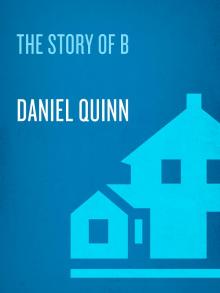 The Story of B
The Story of B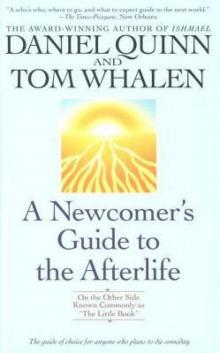 A Newcomer's Guide to the Afterlife: On the Other Side Known Commonly as the Little Book
A Newcomer's Guide to the Afterlife: On the Other Side Known Commonly as the Little Book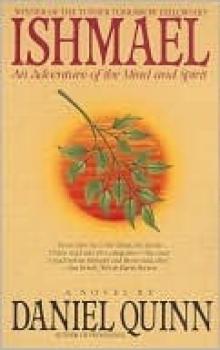 Ishmael: An Adventure of the Mind and Spirit
Ishmael: An Adventure of the Mind and Spirit CLONES: The Anthology
CLONES: The Anthology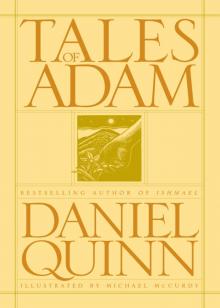 Tales of Adam
Tales of Adam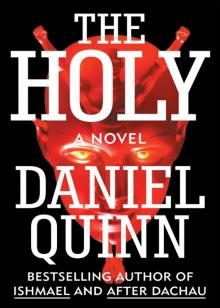 The Holy
The Holy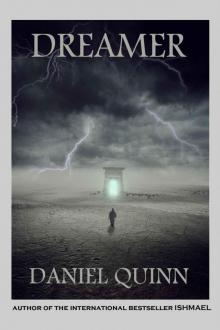 Dreamer
Dreamer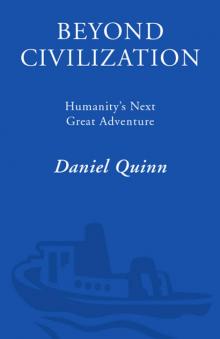 Beyond Civilization: Humanity's Next Great Adventure
Beyond Civilization: Humanity's Next Great Adventure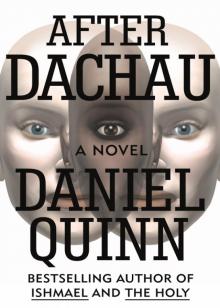 After Dachau
After Dachau If They Give You Lined Paper, Write Sideways.
If They Give You Lined Paper, Write Sideways.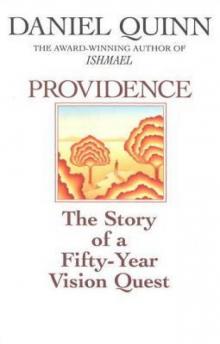 Providence
Providence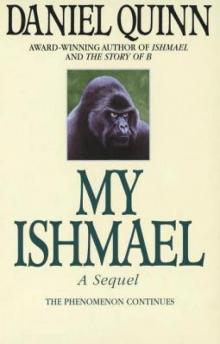 My Ishmael
My Ishmael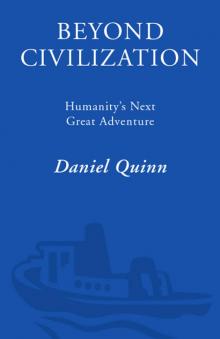 Beyond Civilization
Beyond Civilization If They Give You Lined Paper, Write Sideways
If They Give You Lined Paper, Write Sideways Ishmael
Ishmael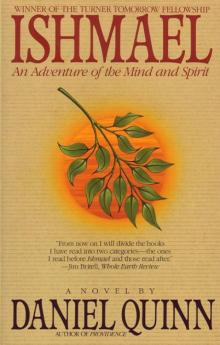 Ishmael i-1
Ishmael i-1 A Newcomer's Guide to the Afterlife
A Newcomer's Guide to the Afterlife